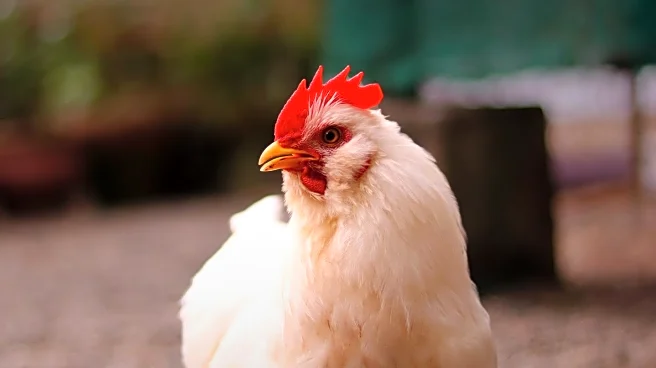What's Happening?
The Department for Environment, Food and Rural Affairs (Defra) has confirmed an outbreak of the H5N1 bird flu virus in commercial poultry near Hallow, Worcestershire. In response, Defra has established
a 3km protection zone and a 10km surveillance zone around the affected premises. All poultry at the site will be humanely culled to prevent further spread of the virus, which can be transmitted through contaminated feed, water, bird droppings, and saliva. Defra has also implemented strict measures in an 'avian influenza prevention zone' across Great Britain, affecting poultry keepers with more than 50 birds and sellers of poultry products. Local rescue organizations have temporarily halted the acceptance of new birds.
Why It's Important?
The outbreak of bird flu poses significant risks to the poultry industry, potentially leading to economic losses and supply chain disruptions. The culling of affected birds is a necessary measure to contain the virus, but it may impact poultry farmers financially, especially those preparing for the holiday season. The establishment of protection and surveillance zones aims to prevent further spread, safeguarding public health and animal welfare. The situation underscores the importance of biosecurity measures and preparedness in managing animal diseases, which can have broader implications for food safety and agricultural practices.
What's Next?
Defra's ongoing surveillance and prevention measures will continue to monitor the situation and prevent further outbreaks. Poultry farmers within the affected zones may need to implement additional biosecurity protocols and adjust their operations to comply with new regulations. The government may also provide support to affected farmers to mitigate economic impacts. Public health agencies will likely remain vigilant, ensuring that the virus does not pose a threat to human health. The situation may prompt discussions on improving disease prevention strategies and enhancing collaboration between government and industry stakeholders.
Beyond the Headlines
The outbreak highlights ethical considerations regarding animal welfare and the humane treatment of livestock during disease control efforts. It also raises questions about the sustainability of intensive poultry farming practices and the need for improved biosecurity measures. Culturally, the outbreak may affect consumer perceptions of poultry products, influencing purchasing decisions and dietary habits. Long-term implications could include shifts in agricultural policy and increased focus on research and development to prevent future outbreaks.









